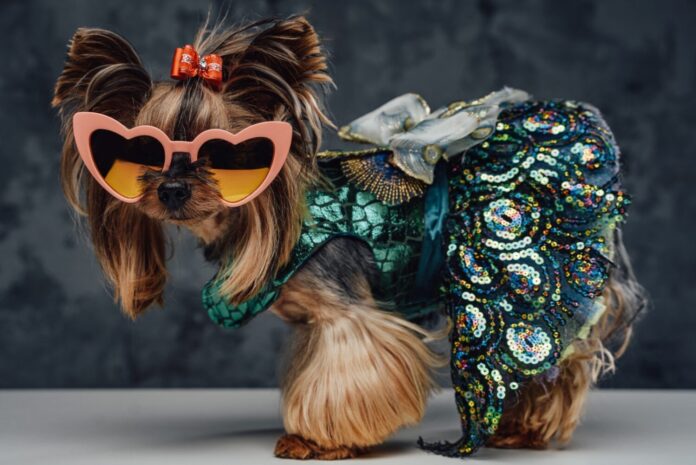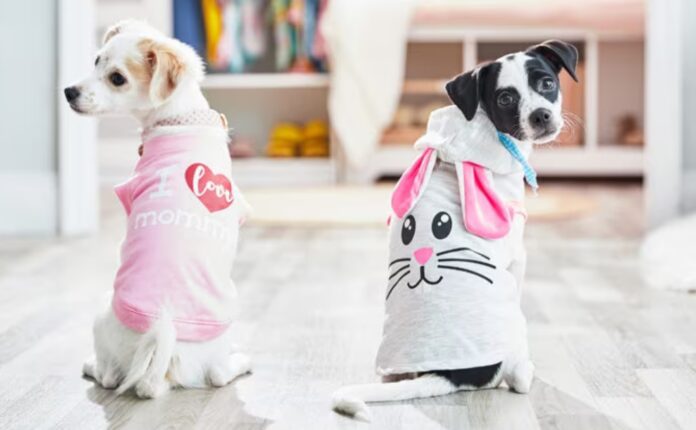In a world where our furry companions are considered an extension of our family, it’s no surprise that the pet apparel industry has witnessed a meteoric rise. But while dressing up your pet can be an exciting way to bond and flaunt their charm, it’s essential to understand the basics and the boundaries.
First Things First – Pet Comfort!
Dressing up pets can be a delightful endeavor, but it’s crucial to ensure their comfort is a top priority.

Materials Matter
When choosing doggy dresses, always prioritize the material. Just like us, pets prefer breathable fabrics, especially during warmer months. Cotton, for instance, is a pet-friendly fabric, thanks to its softness and breathability.
Synthetic materials like polyester can be less breathable and might trap heat, leading to discomfort.
Always check the label and understand the fabric composition. Some pets might be allergic to specific materials, so observing any signs of irritation or discomfort is paramount.
Snug but not Tight!
The fit is as crucial as the fabric. An outfit too tight may restrict your pet’s movement, potentially leading to chaffing or circulation issues. On the flip side, clothes that are too loose can trip them or get caught on objects.
Measure your pet accurately before making a purchase. Most pet apparel brands provide sizing charts, so you’re not left guessing. When in doubt, always opt for a slightly looser fit than a tighter one.
Seasonal Selections
Pets, like us, require clothes tailored to the season to ensure they’re comfortable throughout the year.

Summer Staples
With the mercury rising, it’s vital to pick clothes that protect without overheating. Lightweight, light-colored clothing can help reflect sunlight and keep your pet cooler. Consider materials that wick away moisture to ensure your pet remains dry and comfy.
However, remember that some pets, especially dogs, cool themselves by panting. Avoid covering their entire body, allowing them the freedom to regulate their body temperature.
Winter Wardrobe
Cold climates demand warm and cozy attire. Wool or fleece jackets can be a fantastic choice for pets, keeping them snug during those frosty walks. Do ensure the inner lining is soft to prevent any itching or discomfort.
Also, invest in waterproof apparel if you reside in areas prone to rain or snow. Wet fur can make your pet incredibly cold, so keeping them dry becomes quintessential.
The Goal? Styling with Safety!
While fashion is fun, it shouldn’t come at the cost of your pet’s safety.

Avoid Small Accessories
Tiny buttons, beads, or other embellishments might look cute, but they pose a significant choking hazard if your pet decides to nibble on them. If you’re keen on accessorizing, ensure they’re securely fastened and frequently check for signs of wear or looseness.
The rule of thumb? If it’s small enough to be swallowed, it’s better left off your pet’s attire.
Reflective Gear for Night-Time Walks
Night walks can be risky, especially in areas with limited lighting. Consider integrating reflective patches or stripes in your pet’s apparel. This ensures they’re easily visible to oncoming traffic, reducing chances of mishaps.
It’s not about making a fashion statement; it’s about ensuring their nightly adventures are safe and sound.
Recognizing Unique Needs
Every pet is an individual, and as such, their apparel needs can vary widely based on breed, age, or health concerns.

Breed-Specific Considerations
Some breeds have distinctive body shapes or specific needs. For instance, Greyhounds or Whippets, with their lean bodies, might need warmer apparel even during slightly cooler weather. Similarly, Dachshunds, with their long bodies, might require custom-fitted outfits.
Do your research, or better yet, look for brands that specialize in breed-specific attire. Understanding your pet’s unique physique ensures a better fit and heightened comfort.
Age and Health
Puppies and older pets might need extra protection against the cold, as they can’t regulate their body temperature as efficiently. Similarly, pets with certain medical conditions or skin issues may benefit from protective clothing, but it’s essential to consult with your vet.
For senior pets with arthritis, consider apparel that’s easy to put on and take off, minimizing any discomfort during the process.
Fun vs. Functional – Is It Possible to Have Both?
While it’s tempting to make our pets look Instagram-worthy, it’s essential to strike a balance between fashion and function.

Everyday Wear
Daily apparel should prioritize comfort and functionality. It’s recommended to have breathable and easy-to-clean fabrics that can endure the rough and tumble of everyday pet life. Durability is key, especially if your pet loves outdoor adventures.
Avoid heavy embellishments for daily wear. Instead, opt for solid colors or simple patterns that are both aesthetically pleasing and comfortable.
Special Occasion Outfits
Whether it’s a pet birthday party or Halloween, special occasions might call for more elaborate outfits. While it’s okay to go a bit over the top, never compromise on your pet’s comfort. Make sure they can move freely, and always supervise them when they’re dressed up to ensure they don’t get tangled or ingest any part of the outfit.
Maintenance and Care
Pet apparel, just like our clothes, requires proper care to ensure longevity and hygiene.

Washing and Cleaning
Regularly washing your pet’s clothes keeps them free from dirt, allergens, and potential irritants. Always check the cleaning instructions on the label. While some items might be machine washable, others might require hand washing.
Using a mild detergent and avoiding fabric softeners can prevent any adverse reactions on your pet’s sensitive skin. Also, ensure the apparel is completely dry before dressing up your pet to prevent fungal infections.
Storage
Storing pet apparel properly not only maintains its shape but also prevents any potential infestations, like fleas or mites. Consider using vacuum-sealed bags or dedicated storage boxes. Regularly inspect the clothes, especially if they’ve been stored for an extended period, ensuring they’re clean and safe for your pet to wear.
The Bottom Line
From understanding the basics to diving deep into specifics, dressing up your pet can be both fun and beneficial. Remember, while it’s great to have them look stylish, their comfort and safety should always be front and center.







